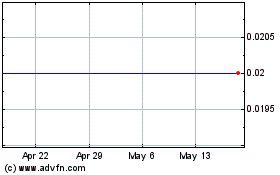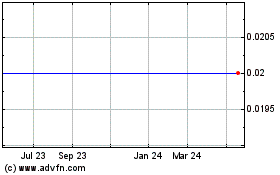Advanced Proteome Therapeutics Corp. (APC) Provides Update on Ongoing Activities
December 19 2013 - 2:06PM
Marketwired
Advanced Proteome Therapeutics Corp. (APC) Provides Update on
Ongoing Activities
VANCOUVER, BRITISH COLUMBIA--(Marketwired - Dec 19, 2013) -
Advanced Proteome Therapeutics Corporation ("APC" or the "Company")
(TSX-VENTURE:APC) is pleased to announce that through calendar year
2013 the Company has been applying its enabling Foundation Trinity™
Technology to proteins targeted for the treatment of cancers.
Advanced, targeted therapies are intended to attack primarily
cancer cells and are expected to dominate the anti-cancer
therapeutics market in the near future. APC's technology will
enable not only therapy targeted for tumor cells, but also
the delivery of combination therapy in a single,
pure therapeutic agent. To achieve this, it has been the
Company's intention to utilize a unique protein, not only as a
delivery system to tumor cells, but also as a scaffold upon which
to attach each anti-cancer entity to its own specific site on the
protein surface - both key to efficient manufacturing and product
development. What is more, the protein itself appears to possess
immunotherapeutic properties. Immunotherapy is perhaps the most
powerful current approach to cancer, and one of great commercial
interest to the pharmaceutical industry. This vision, the unique
nature of the protein, and the ability to apply its proprietary
enabling chemical technology to modification of the protein,
differentiate APC from the competition.
Since the Company has made the targeted delivery of anti-cancer
drugs to tumor cells its point of focus, APC has prepared several
molecules using its patent-pending technology, which the Company
regards as the first of a number of series that the
Company has conceived as potential anti-cancer agents. To test
these molecules against tumor cells and animal models of cancer to
meet preclinical requirements, the Company has executed agreements
with academic collaborators who are experts in the field of cancer.
In the first round of testing, all members of the first series
exhibited high affinity for specific cancer cells and no obvious
toxic effects on healthy cells. The unmodified protein alone has
demonstrated the ability to retard tumor growth. A protein
conjugate prepared by APC and its collaborators has been shown to
concentrate in tumors.
Company scientists are excited by these results, and the Company
plans to select a lead member of each series for advanced
preclinical development. It expects that this testing will occur
over the next few months to measure the relevant parameters in
preclinical models leading to the selection of candidates with the
best mix of properties for further development. The Company plans,
concurrently, to seek out Corporate Partners in the pharmaceutical
industry for joint efforts or licensing deals, which would support
Company programs and advance eligible candidates toward clinical
trials.
Alexander Krantz, President and CEO, stated, "The Company is
grateful for the support and encouragement it has received from its
investors and delighted with the direction and progress it has made
this past year. We will be working diligently toward our objectives
to treat this dreaded disease with kinder and gentler drugs, and
look forward to 2014 as a pivotal year for the Company. Our very
best wishes to all for the Holidays and New Year."
About APC
APC specializes in the development and patenting of advanced
methods and platform technologies designed to deliver drugs to
specific cellular targets. The Company's patent-pending technology
creates transportation systems for drugs to target cells that need
to be destroyed, such as cancer cells. APC uses its proprietary
enabling technology for chemical modification of the carrier
proteins. These methods allow the drug, in accord with regulatory
requirements, to be site-specifically attached to the carrier
protein which tracks to cancers cells. APC is focused on developing
the first commercial application of cancer cell targeting by a
specific protein family that has an affinity for cancer cells. Due
to its high affinity for a target receptor on cancer cells, the
protein can function as a transport system for drugs linked to its
surface, with the prospect of avoiding the debilitating toxic
effects that have plagued the use of chemotherapeutic drugs.
By virtue of similar affinity of the protein family for cells in
the process of dying, the foregoing technologies are also
applicable to the repair of cells where loss of function is a
critical event, such as in eye diseases and myocardial
infarction.
ON BEHALF OF THE BOARD
Alexander (Allen) Krantz, President and Chief Executive
Officer
Neither the TSX Venture Exchange nor its Regulation Services
Provider (as that term is defined in the policies of the TSX
Venture Exchange) accepts responsibility for the adequacy or
accuracy of this release. The forward-looking statements contained
in this news release involve risks and uncertainties, and are
subject to change based on various important factors including
timely development and acceptance of new products, gaining product
approval, successful entry into new markets, changes in financing
conditions, and changes in FDA regulations.
Advanced Proteome Therapeutics Corporation(617)
638-0340www.advancedproteome.com
Advanced Proteome Therap... (TSXV:APC)
Historical Stock Chart
From Dec 2024 to Jan 2025

Advanced Proteome Therap... (TSXV:APC)
Historical Stock Chart
From Jan 2024 to Jan 2025
